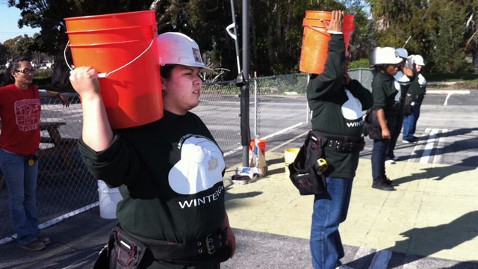Women Get Skills to Break Into Traditional Men's Trades

Image credit: Scott Shulman/ABC
In the shadow of a Long Beach, Calif., power plant, a dozen women step into tool belts, don hard hats and learn how to carry a bucket of cement up a flight of stairs to get a leg up on trades usually dominated by men.
According to a 2009 Department of Labor report, while gender equality has made headway in the executive ranks - a quarter of CEOs are women - less than 1 percent of 77,000 U.S. ironworkers and steelworkers are female.
Sherron Ballard, 55, used to be a real estate agent - now she wants to work in construction.
Ballard told ABC News that she was making the job switch for the higher income, which would help her raise her daughter.
She is participating in a grueling 10-week program by Women in Non Traditional Employment Roles, or Winter. The Los Angeles group, in its 15th year, trains women to become plumbers, electricians and ironworkers - well-paid, blue-collar occupations previously dominated by men.
At one California construction site, 250 men worked alongside two females.
Winter's goal is to tip that balance. The women earn safety certificates, learn about timekeeping, what to wear on construction sites and how to handle discrimination.
"When they go out there for their first job, a lot of people are gonna look at them and say: 'Why aren't you home? What are you doing here? Are you sure you're in the right place?' And they need to learn how to brush it off and continue on with their work," said Berta Campos, a program instructor. "I think we need more women in order for men to change their mind and we have to prove them wrong."
"Women have to go out to work," said Donna Williamson, who recently graduated from the program. "I have a child. I have to support him."
Williamson, a 41-year-old single mother, used to make minimum wage selling skateboards in a bike shop. Now she's an apprentice ironworker making $28 an hour, and her wages will are sure to increase as she progresses in her career.
"I used to drive around and I'd look at the guys on the beams, on the high-rises, and it's one of those intriguing things," she said. "There are not a whole lot of women in the construction field. At the end of the day, you are dirty, you are sweating, you don't smell the greatest and that's fine with me."
"I love my job," Williamson said. "If I can do it, they [women] can do it. And I'm only 5'2."